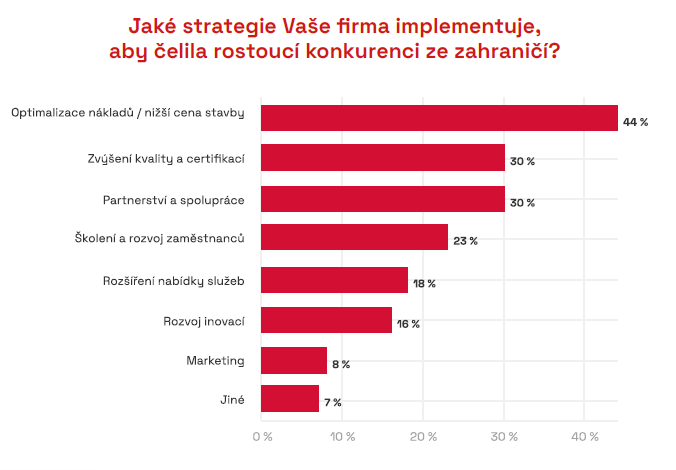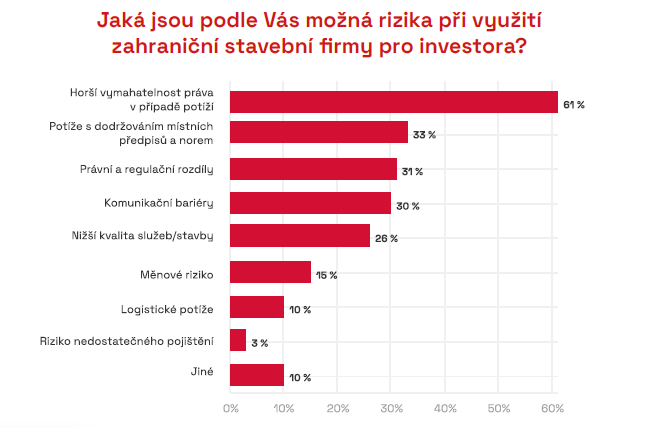PRAGUE, 25 June 2024 - According to the company's research CEEC Research 34 % directors of construction companies have seen an increase in foreign competition in the Czech market over the last 5 years. This affects market dynamics and the competitive environment. Foreign companies are perceived to be stronger due to lower prices, which 49 % construction company directors consider to be a major advantage. Some construction companies point out that this price advantage is often at the expense of quality.
Conversely, 66 % directors said they did not perceive a significant increase in foreign competition. For most Czech construction companies, the competitive environment remains stable, with no significant influence of foreign players.

"Maintaining the competitive position of construction companies on the Czech market in the context of growing foreign competition requires a comprehensive approach that combines innovation, quality, efficiency and state support. Companies can focus, for example, on the implementation of digital solutions or the use of advanced building materials. Various certifications or the development of strategic partnerships within the construction sector can also help them compete. However, the role of the state must not be overlooked. Simplifying bureaucratic processes and ensuring transparency in public procurement can help reduce the scope for corruption and increase the chances of domestic companies in a competitive environment," He told Director of CEEC Research, Michal Vacek.
Moritz Freyborn, Chairman of the Board of Directors of STRABAG, which took 2nd place in this year's TOP Construction Company of the Year competition, says: "Competition is beneficial in any industry. As far as new foreign construction companies are concerned, when entering the Czech market they most often choose the strategy of underfunded construction. However, this strategy is unsustainable in the long term. In our opinion, multi-criteria evaluation should play a major role in the selection of a construction contractor. It should be in the interest of the state to maximise the employment of people from the local area, to use local building materials as much as possible and to use the know-how of local engineers and specialists."
Other competitive advantages include a more extensive network of suppliers and subcontractors (19 %) allowing foreign firms to be more efficient and flexible. Access to more advanced technologies is perceived as a competitive advantage by 18 % directors of construction firms.
Czech construction companies are forced to compete with foreign ones and implement different strategies in the competitive struggle
For 44 % Czech construction companies, cost optimization and reduction of construction prices is a fundamental strategy. This approach allows to offer more attractive prices and attract more customers.
Improving quality and obtaining certifications is an important strategy for the 30 % directors, as it strengthens customer confidence and increases the company's competitiveness in the marketplace. Similarly, the 30 % respondents rely on partnerships and collaborations with other companies, which brings new opportunities. Staff training and development, mentioned by 23 % directors, strengthens the skills and competencies of teams. The combination of these strategies enables Czech construction companies to face foreign competition.

Only 15 % Czech construction companies participate in foreign construction projects. Participation in foreign projects brings new technological and business knowledge that can be subsequently applied on the domestic market. The vast majority, 85 % companies, remain active exclusively in the domestic market. They focus on strengthening their position in the Czech Republic without having any significant ambitions to expand abroad. The reasons for remaining exclusively on the Czech market are varied. It may be a lack of resources, a focus on the local market, or concerns about the risks associated with operating in foreign jurisdictions. It may also be more profitable and strategically sensible for some companies to focus on domestic projects where they have better market knowledge.
Sales Director of Subterra a.s., Jiří Tesař, states that: "Most of the large construction companies in the Czech Republic are now in the hands of foreign capital. The Czech Republic is part of the EU, which is based on the free movement of goods, people and capital. The possibilities for state intervention in protecting the domestic market are therefore very limited. Subsidies along the lines of agriculture in the construction industry do not exist anywhere."
The main risk of using a foreign construction company is the lower enforceability of the law
The biggest risk for the investor, in the case of using a foreign construction company, is the worse enforceability of the law in case of difficulties, which was mentioned by 61 % directors of construction companies surveyed. This problem can significantly complicate dispute resolution and enforcement. This would pose serious difficulties for investors. Another risk is the legal and regulatory differences mentioned by 31 % directors. Differences in legal and regulatory provisions lead to confusion and problems with compliance with local laws. Communication barriers are seen as a problem by 30 % directors, making effective cooperation and coordination between the investor and the foreign company difficult.

"Based on our experience, we see that the entry of foreign companies into the construction market in the Czech Republic is in many respects much easier than the entry of Czech companies into markets abroad. However, trying to protect the domestic market in any way against foreign competition is not the solution to maintaining a competitive environment. On the part of the contracting authorities, it is important to responsibly set and subsequently examine, assess and evaluate all qualification requirements submitted by companies in the framework of the procurement procedures. In short, whether what companies declare in their tenders is actually true," Says Martin Kvirenc,Chairman of the Board of Directors of Enteria, a.s.
(za)



